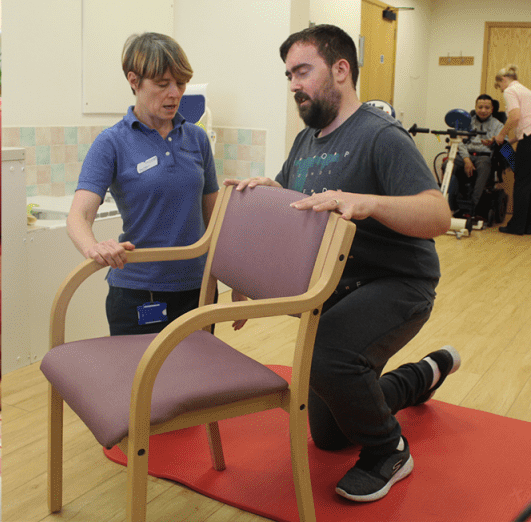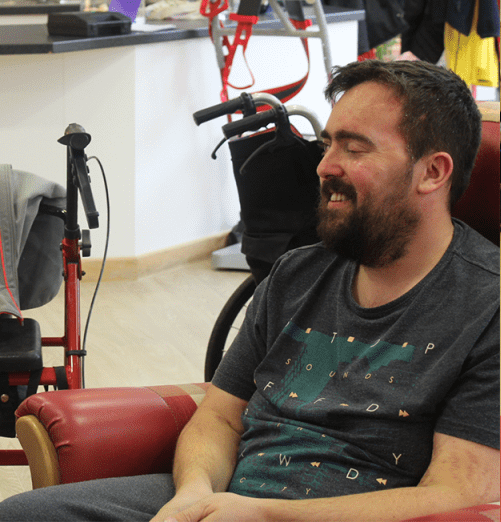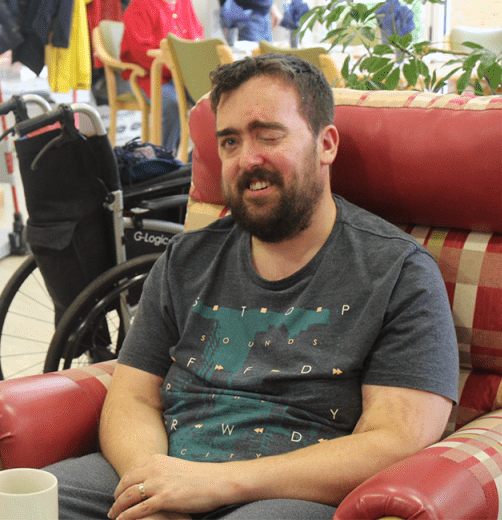Over 100 prizes to be won every week!
- 1st Prize: £1,000
- |
- 2nd Prize: £100
- |
- 3rd Prize: £50
- |
- 20 x £10
- |
- 80 x £5
Andrew T’s Story
12 April 2023
When he was 18, Andrew was diagnosed with a brain tumour. Over the years he had several operations and many therapy sessions, but was eventually given the news that there was nothing more that could be done for him. Doctors estimated he had three months to live, that was 6 years ago.
“I was told to get in touch with my local hospice and start to arrange things with them. My family and I were horrified. The word ‘hospice’ filled me with fear; I thought it was somewhere that you go for your final weeks. I imagined it being not very nice, and being full of ill people that were unfortunately close to dying – but it was completely different to my expectations.”
“We got in touch with Phyllis Tuckwell and they arranged for us to see a counsellor, to help us get over the initial shock of my prognosis. I came in with my wife, Caroline, and our daughter Bethany, and we started weekly counselling sessions. The counsellors would come out to our house or to my place of work. They would fit in with when we were free. The counselling really helped. Bethany was only three at the time when I was first told that I needed the Hospice’s help, and it was very difficult to tell her that her daddy hasn’t got much longer to live. The counsellors here have been absolutely fantastic. They know exactly how to deal with somebody of her age and they’ve taken the pressure off us to tell her what’s going on. When I was given my prognosis, I didn’t really think of how it would affect my friends and family. The counsellors have helped all of us though. They’ve visited Caroline outside of the Hospice and have helped her to come to terms with the horrific news. They’ve also offered counselling to my parents and my brother. We’ve got a very close family and they’ve been there for us all over a very horrible time.
As well as seeing the counsellors, I was also referred to Phyllis Tuckwell’s Occupational Therapists. At the time, I was disabled but able to maintain a good standard of living – I could still do things for myself. However, as we didn’t know what would happen in the future, the Occupational Therapy team came out and looked at the house, and put in a lot of equipment to help me out. They had rails installed outside the house, and inside the house they provided me with bath equipment to help me bathe, and bed equipment to help me get on and off the bed independently.”
“After seeing the Occupational Therapist, I was introduced to the Physiotherapy team. At that time I was using a wheelchair, and I missed the independence of being able to walk around on my own. They helped me to get walking again, using walking aids, and they’ve helped me with my balance and stamina too. I still can’t walk very far outside with my walking frame, but going back to the physio I’ve been able to expand on that and really learn how to use the right posture and ways to walk. They’ve really helped me get out of bad habits and into good habits again, and this has helped not just here but everywhere that I am able to go.”

“Phyllis Tuckwell also invited me to their Day Hospice sessions, and I started coming once a week for 12 weeks. There were a group of ten of us, and it was fantastic! The staff and volunteers are so friendly, so supportive, and nothing is too much for them. They help you in so many different ways; they made me feel very relaxed and welcome there.”
Day Hospice is part of the Living Well service, and it really was living very well. There are different sessions on offer every week, and you can go along to them if you want to. You’re not pushed into going, but they really do help you when you do go.
I’ve gone to the relaxation class, ‘Learn to Relax’, which is led by the Occupational Therapists. It does exactly what it says on the tin – it helps you relax and drift away for a while. You sit in a comfortable chair, listen to nice music, and the leader of the session helps you to imagine that you’re on a beach or in a nice garden with nobody else around. You can just close your eyes and imagine you’re there, and relax for the half an hour session. It also means that you can bring that experience with you and use it when you’re at home, when you can’t sleep or when something’s bothering you. You can remember those sessions that you had and almost re-enact what you did in them.
There are also the mindfulness sessions, which help you find different ways to think about stresses and bad thoughts. You learn a different way to see things; a different way to breathe. I found those sessions very helpful. There’s a lot on your mind when you’ve got cancer, so it’s nice just to think of different things and perhaps think about your fears in different ways.
They also run other activities, such as art classes and music quizzes, which everybody can join in with. The Complementary Therapists come round and give massages, and a volunteer hairdresser comes in to offer free haircuts. Caroline, Bethany and I have also attended the Therapies Through Nature group, where we created a vegetable trug together.
All of the patients at Day Hospice eat lunch together. The food that they serve is absolutely fantastic and it’s all made in the Hospice. You get a nice three-course meal that includes a wine or a beer if you like. It’s lovely – it’s just like going to a restaurant!
The support from the other people who attend the Living Well service is fantastic. I’m quite shy really and not a people person – I’m somebody who would normally just stay at home and sit on my computer or watch television. To come out was perhaps against what I would normally want to do, but it made a real difference to me to be introduced to others who were in a similar situation to me. Obviously all experiences are different, but we all have something in common. It’s nice to talk to people, both old and young, and to meet staff and volunteers who are there to help you. We all have a great laugh. You can forget about the worries you have and stop thinking about things that are going to happen in the future. The staff and volunteers are always there to support you and help you, and not just for the 12 weeks that you attend Day Hospice. They’re always there for you and they will always remember you. I know that I will be able to come back to the Living Well service if I need to.

Most of the time, one of my family members has been able to bring me to Day Hospice and take me home afterwards, but there are occasions when they’re busy and I have no other way of getting there. When that happens, the Hospice staff don’t just say ‘okay we’ll rearrange you for next week’, they help me to get in. They have some volunteer car drivers that can come out and collect you, or take you home afterwards, and they are very happy to do this. I’ve had people that have brought me in who have been volunteering for Phyllis Tuckwell for over 15 years, so it shows how much it means to them, knowing they can help. And it’s a great help to me and my family when they’re not able to take and collect me.
The Living Well activities have made a massive difference to my life – not just mine but my family’s as well. They offer a fresh new way of thinking about things and it really does give you a different look into how cancer affects you and how you can deal with it in so many different ways.
Over 100 prizes to be won every week!
- 1st Prize: £1,000
- |
- 2nd Prize: £100
- |
- 3rd Prize: £50
- |
- 20 x £10
- |
- 80 x £5

